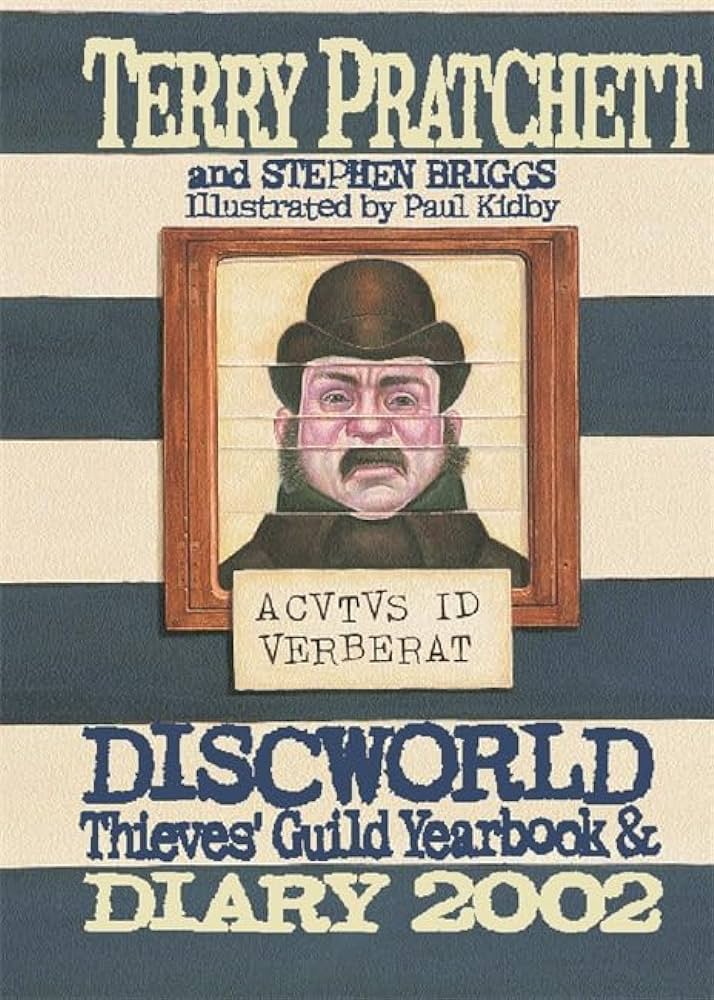Note: If you wish to receive, via e-mail, (1) my weekly newsletter or (2) daily copies of these posts, write to me at [email protected]. Comments may also be sent to this address. I promise not to share your e-mail with anyone. To unsubscribe, write here as well.
Wednesday
It may come as a surprise to those who listen to Donald Trump that America’s crime rate has been dropping dramatically in the last few years. According to new FBI statistics released last month, murders have dropped 13% since last year and violent crime is down 6%. Property crime too is down 3%. We apparently are back to pre-pandemic levels.
Crime, while never good, seems to be one of those issues like immigration—which is to say, concern about it rises and falls depending on whether or not we are in an election year. For politicians, it’s largely a matter of managing perception. Which brings me to Terry Pratchett’s Lord Vetinari.
Vetinari is the Patrician of Ankh-Morpork, a parody of a great but squalid city. Though it has every ill that one associates with a city, it nevertheless works, in large part because Vetinari is a genius at managing conflict. His answer to crime is to establish a Thieves Guild.
We learn about the Thieves Guild in Guards! Guards!, the first of Pratchett’s Sam Vimes books. The series is a comic parody of hard-boiled detective novels (Vimes, Captain of the Night Watch, is a Sam Spade type), and in it we learn of Vetinari’s approach. As Pratchett explains,
One of the Patrician’s greatest contributions to the reliable operation of Ankh-Morpork had been, very early in his administration, the legalizing of the ancient Guild of Thieves. Crime was always with us, he reasoned, and therefore, if you were going to have crime, it at least should be organized crime.
In Pratchett’s description, the Thieves Guild works somewhat like the Federal Reserve, which is designed to protect society from inflation on the one hand and recession on the other. For its part, the Thieves Guild agrees to maintain crime at a level “to be determined annually”:
And so the Guild had been encouraged to come out of the shadows and build a big Guildhouse, take their place at civic banquets, and set up their training college with day-release courses and City and Guilds certificates and everything. In exchange for the winding down of the Watch, they agreed, while trying to keep their faces straight, to keep crime levels to a level to be determined annually. That way, everyone could plan ahead, said Lord Vetinari, and part of the uncertainty had been removed from the chaos that is life.
I love the phrase “chaos that is life.” And indeed, Vetinari’s policy turns out “very satisfactorily from everyone’s point of view”:
It took the head thieves a very little time to grow paunches and start having coats-of-arms made and meet in a proper building rather than smoky dens, which no one had liked much. A complicated arrangement of receipts and vouchers saw to it that, while everyone was eligible for the attentions of the Guild, no one had too much, and this was very acceptable—at least to those citizens who were rich enough to afford the quite reasonable premiums the guild charged for an uninterrupted life. There was a strange foreign word for this: inn-sewer-ants [insurance]. No one knew exactly what it had originally meant, but Ankh-Morpork had made it its own.
The system, it so happens, leads to defunding the police:
The Watch hadn’t liked it, but the plain fact was that the thieves were far better at controlling crime than the Watch had ever been. After all, the Watch had to work twice as hard to cut crime just a little, whereas all the Guild had to do was to work less.
This is not Vetinari’s only innovation. Figuring that there will always be people who want to overthrow the government, he surreptitiously sets up a number of insurrectionary groups so that they will spend all their time fighting each other. Vetinari knows that the most dangerous citizens are humorless ideologues, and he is endlessly imaginative and counterintuitive in finding ways to counteract them.
Pratchett’s comic genius, akin to Jonathan Swift’s, stems from knowing that perfection is overrated. Attempting to stamp out all society’s flaws only leads to various totalitarian systems that can’t acknowledge that we humans are basically a messy lot. That’s not to say that we should abandon our pursuit of social justice and income fairness. But we need to do so while laughing at ourselves.
In other words, be suspicious of anyone who speaks in absolutes, whether about crime or immigration or abortion or education or political correctness. France’s Republic of Virtue led to the Reign of Terror, Hitler’s pure-blooded Aryans carried out the Holocaust, and Stalin’s and Mao’s visions of a perfect communal society led to the slaughter of millions.
The best we can do is more or less manage the chaos that is our lives. And to do so while not taking ourselves too seriously.
